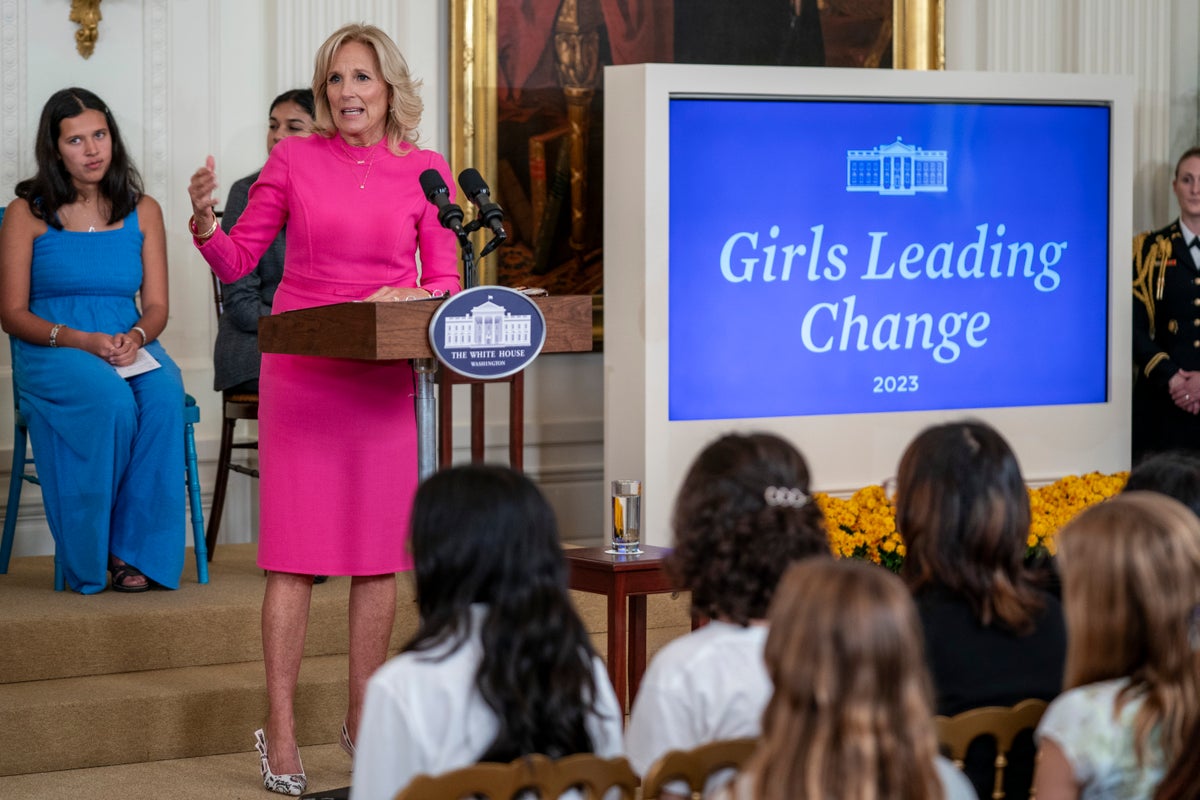
Fifteen young women were honored at the White House on Wednesday for their advocacy on a range of issues in their communities across the United States, from lobbying for tighter gun laws and against book bans to encouraging civic engagement and ensuring access to menstrual supplies.
The issues that earned these 15 teenagers a trip to the White House are also priorities for the Biden administration, including first lady Jill Biden, who hosted the first “Girls Leading Change” event to celebrate Wednesday's designation by President Joe Biden as International Day of the Girl.
The honorees, including a pair of twins, range in age from 15 to 18 and represent 13 states.
“They're protecting and preserving our earth, writing and sharing stories that change minds, using their summer breaks to testify before their state legislature and turning their pain into purpose,” Jill Biden said. “You saw something that you knew was wrong and you decided to fix it. You represent every girl's potential.”
The White House Gender Policy Council chose the honorees from about 600 nominations. They are:
— Breanna and Brooke Bennett, 16, of Montgomery, Alabama, have given away thousands of kits with sanitary pads and toiletries through their organization, Women in Training.
— Jazmin Cazares, 18, of Uvalde, Texas, became an activist against gun violence at the state and national level after her sister Jackie was killed in the shooting at Robb Elementary School.
— Mona Cho, 15, of Redondo Beach, California, works to combat online harassment and abuse by through her service on the Beach Cities Health District's Youth Advisory Council.
— Julia Garnett, 17, of Hendersonville, Tennessee, advocated in her school district for student representation on book review committees and served on her high school's committee. She also has testified to Congress on book bans.
— Logan Hennes, 16, of New York, has taken a leadership role through the American Jewish Committee to support like-minded students who want to address antisemitism in their schools and communities.
— Anja Herrman, 17, of River Forest, Illinois, is a disability rights activist and advocate for equity and inclusion. She has served since 2021 as the youngest appointed member of the her community's Diversity, Equity and Inclusion Advisory Group.
— Leela Marie Hidier, 18, of Yarmouth, Maine, is a climate social justice advocate and author of an award-winning debut novel, “Changes in the Weather,” about four teenagers who have been displaced by climate change in the U.S.
— Elisa Martinez, 17, of Las Vegas, encourages civic engagement, particularly within the Latino community. She founded her school's Latino Student Union and organizes students on issues like climate justice and preventing gun violence.
— Gabriella Nakai, 17, of Phoenix, is a Navajo and Choctaw leader who works on improving food security and sustainability. She works to address youth homelessness and mental health in Phoenix.
— Zahra Rahimi, 17, of Alexandria, Virginia, arrived in the U.S. from Afghanistan four years ago and has become dedicated to helping other refugees resettle in her community, including through access to English language services in the public schools.
— Gitanjali Rao, 17, of Highlands Ranch, Colorado, is a first-year scientist at the Massachusetts Institute of Technology who has won awards for developing a tool to detect lead contamination.
— Avery Turner, 17, of Colorado Springs, Colorado, supports military children like herself through her role of director of programs at Bloom, an organization started by military teenagers. She moved 10 times before her father recently retired from the Air Force.
— Sandra Ukah, 18, of Lake Mary, Florida, is a first-year student at the University of Florida who was a co-founder and co-president of Seminole High School's Black Student Union, the first one in the country. She also helped create chapters in all of the county's high schools.
— Rania Zuri, 18, of Morgantown, West Virginia, is CEO of The LiTEArary Society, a nonprofit organization she founded when she was 13 to end “book deserts” for disadvantaged preschool children in federal Head Start programs in all 50 states.







